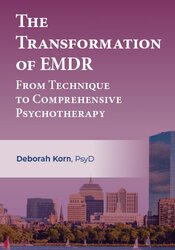
Trending Topics:
×

This recording provides an introduction to EMDR (Eye Movement Desensitization and Reprocessing), which is a unique type of psychotherapy proven to help clients recover from trauma and improve the quality of their lives. Trauma is stored in the brain and body, continuing to cause pain and suffering, and EMDR can free clients by repatterning thinking and emotional reactions. This recording will help you understand the evidence to support EMDR and all of its applications. As well as, a look at the evolution of EMDR - from technique to a comprehensive, integrative psychotherapy tool.
This course is not affiliated with EMDRIA and does not qualify toward EMDRIA credits or training.
This program was developed through the joint providership of PESI, Inc. and the Trauma Research Foundation.
All members of the PESI, Inc. planning committee have provided disclosures of financial relationships with ineligible organizations and any relevant non-financial relationships prior to planning content for this activity. None of the committee members had relevant financial relationships with ineligible companies or other potentially biasing relationships to disclose to learners. For speaker disclosures, please see the faculty biography.
NOTE: Tuition includes one free CE Certificate (participant will be able to print the certificate of completion after passing the online post-test (80% passing score) and completing the evaluation). Instructional methods will include PowerPoint, didactic lecture, and others.
Continuing Education Information: Listed below are the continuing education credit(s) currently available for this non-interactive self-study package. Program content is reviewed periodically per accrediting board rules for currency and appropriateness for credit. Credit approvals are subject to change. Please note, your licensing board dictates whether self-study is an acceptable form of continuing education, as well as which credit types are acceptable for continuing education hours. Please refer to your licensing board's rules and regulations. If your profession is not listed, please contact your licensing board to determine your continuing education requirements and check for reciprocal approval.
For other credit inquiries not specified below, please contact info@pesi.com or 800-844-8260 before purchase.
Materials that are included in this course may include interventions and modalities that are beyond the authorized practice of your profession. As a licensed professional, you are responsible for reviewing the scope of practice, including activities that are defined in law as beyond the boundaries of practice in accordance with and in compliance with your profession's standards.
For Planning Committee disclosures, please see the statement above. For speaker disclosures, please see the faculty biography.
Earn up to 1.0 CE hours. Please see below, for more details, as credit amounts vary by jurisdiction and profession.
PESI, Inc. is approved by the Canadian Counselling and Psychotherapy Association to offer continuing education for counsellors and psychotherapists. PESI, Inc. maintains responsibility for the program. This self-study activity is approved for 1.0 credit hours.
This self-study activity qualifies for 1.0 continuing education clock hours as required by many national and local licensing boards and professional organizations. Save your activity advertisement and certificate of completion, and contact your own board or organization for specific requirements.
| File type | File name | Number of pages | |
|---|---|---|---|
| Handout - The Transformation of EMDR (12.6 MB) | 25 Pages | Available after Purchase | |
| Text Document | References (143.8 KB) | 4 Pages | Available after Purchase |
| Text Document | Transcript (35.9 KB) | 25 Pages | Available after Purchase |
| Handout - The Transformation of EMDR - French (12.6 MB) | 25 Pages | Available after Purchase | |
| Text Document | References - French (143.8 KB) | 4 Pages | Available after Purchase |
| Text Document | Transcript - French (35.9 KB) | 25 Pages | Available after Purchase |
| Handout - The Transformation of EMDR - Italian (12.6 MB) | 25 Pages | Available after Purchase | |
| Text Document | References - Italian (143.8 KB) | 4 Pages | Available after Purchase |
| Text Document | Transcript - Italian (35.9 KB) | 25 Pages | Available after Purchase |
| Handout - The Transformation of EMDR - German (12.6 MB) | 25 Pages | Available after Purchase | |
| Text Document | References - German (143.8 KB) | 4 Pages | Available after Purchase |
| Handout - The Transformation of EMDR - Spanish (12.6 MB) | 25 Pages | Available after Purchase | |
| Text Document | References - Spanish (143.8 KB) | 4 Pages | Available after Purchase |

Deborah L. Korn, PsyD, maintains a private practice in Cambridge, MA, is an adjunct training faculty member at the Trauma Research Foundation and is a senior faculty member at the EMDR Institute. Dr. Korn has authored or coauthored numerous articles and chapters focused on EMDR therapy, including comprehensive reviews of EMDR applications with Complex PTSD. She is an EMDR International Association-approved consultant and is also on the Editorial Board of the Journal of EMDR Practice and Research. She presents and consults internationally on the treatment of adult survivors of childhood abuse and neglect. Every Memory Deserves Respect, her new book about EMDR therapy, was co-authored with Michael Baldwin and written for the layperson.
Speaker Disclosures:
Financial: Deborah Korn maintains a private practice and has employment relationships with The Trauma Research Foundation and The EMDR Institute, Inc. She receives royalties as a published author. She receives a consulting fee with Arctop. Deborah Korn receives a speaking honorarium and recording royalties from PESI, Inc. She has no relevant financial relationships with ineligible organizations.
Non-financial: Deborah Korn is a member of the American Psychological Association and the EMDR International Association.
Access never expires for this product.
Visit our FAQ page at https://www.pesicanada.com/faq or contact us at https://www.pesicanada.com/contact-us
Satisfaction Guarantee
Your satisfaction is our goal and our guarantee. Concerns should be addressed to info@pesicanada.com.
Please wait ...